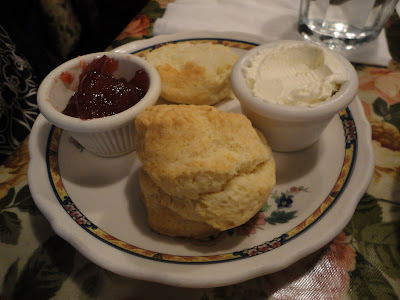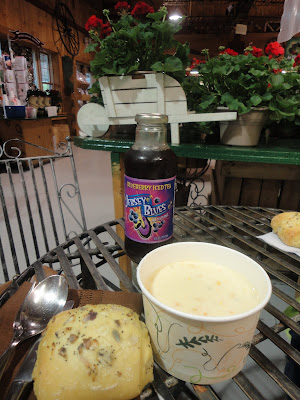
In "Wampum Prayer" off of Tori Amos' Scarlet's Walk album, a sonic road trip around America, Amos (who has Cherokee blood on her mother's side) calls upon the voice of an old Apache woman. She describes it as bestowing a curse or a blessing on the settlers who have come to America and taken and taken and taken.
"In our hand an old, old, old thread.
Trail of blood and amens.
Greed is the gift for the sons of the sons.
Hear this prayer of the wampum. This is the tie that will bind us."
Native Americans tribes inhabited the area I live in (the northern tip of New Jersey) for 10,000 years. It only took a few hundred years to wipe most out through disease, alcohol, bloodshed and relocation, as was recalled at the Bergen County Historical Society's Lenape New Year.
From their site:
"The first Dark Moon after the Long Moon marks the arrival of Chwame gischuch, the Shad Moon, and the New Year of the ancient Sanhicans and Minisinks, locally known as the Hackensacks and Tappans. Native peoples returned from their winter villages, gathering at the narrows of the great streams, in places such as Acquackanonck (Garfield) and Aschatking (New Bridge), to set their fykes and weirs and catch smelt and later shad as these fish ran up the rivers in great numbers."
Reflect on the idea of living in harmony with nature, and how very far removed we are from that in modern times. Like the settlers hundreds of years before, we take, and take, and take.
Tobacco leaves, which were left on the animal after it was killed and the animal was asked for its forgiveness for its life. Consider the respect given to animals in the Native American culture, versus the exploitation that exists in factory farming today.
Wayne Pacelle, the CEO and President of The Humane Society of the United States, observed, "We have so much power in this relationship [with animals], and for so many years we've treated that power as license. That we could do whatever we wanted with it."
Mr Pacelle has a new book out, The Bond: Our Kinship with Animals, Our Call to Defend Them.

Lower than the animals is how one Presbyterian minster described the Indians. Savages. Who are the true savages?
Nothing was wasted - animal, plant, material. Squash shells for bowls.

A red blanket from the Hudson Bay Company. The two stripes represented the numbers of furs the blanket would be traded for. How upsetting today to see people mindlessly wearing fur trims and coats with no care for the animals who suffered for senseless fashion vanity. No one
needs fur today to survive. But the life of animals, disregarded in our culture. Most feel entitled to exploit them for their wants (not needs) of the day.


A snapping turtle rattle used by the medicine men. How often healing is mind over matter.
I recalled my friend Jennifer's tale of her father shooting a snapping turtle, and the often disharmonious relationship between animals and people. You can read
"Why I Don't Like Pink" here.
Speaker Bob Wills from
Sunrise Trading Post, holding up a deer hide (note George Washington watching over his shoulder). Deer are now slaughtered in New Jersey for being a nuisance. Again, who is the nuisance to Mother Nature - man or animal? I wonder this observing the litter lined roads on my bus in and out of New York City everyday, and on garbage night with the abundance of perfectly good items heading to the overflowing landfills. Even in economic lean times, we are the land of excess.

Mr. Wills recalled telling some Native Americans he thinks they have been wronged and would give the land back to them if he could. They replied they wouldn't want it - we've screwed it up too much.
"They live in the forest in nakedness, in sin and degradation. They make nothing of the land. They live worse than beggars," says Goodwife Anne, in
Celia Rees' Witch Child, a novel based on the premise a collection called "the Mary papers" was found hidden in a quilt from the colonial period guessed to be from 1659. Mary says, "I want to shout, cry out about how little she understands. The Indians go lightly on the world, that is all. They make their homes from living trees, only take what they need before moving on to let the land replenish itself." Replenish, go lightly? Why can we not do the same?
When the old Indian man is dismayed to hear of colonists killing wolves, "He says everything has its own place in the world, wolves and men."
I love this photo of Mary (of Indian descent) who does the cooking in the Dutch out kitchen.

Gathering at the tavern after over hoecakes (corn cakes) with blueberry jam and hot cider. Maybe I'm romanticizing it, but I love the idea of the tavern as a meeting house for sharing ideas, lively talk of the politics of the day, local activism. Meeting of the minds often occurs online now, but wouldn't it be nice in person sometimes. How I wish, readers, we could all gather in a room to discuss our nation, which seems a bit troubled on its path.

As I admired on the daffodils popping up, one of Mother Nature's gifts for the eyes, I vowed to continue to go lightly on my path as much as I can, with respect for other species who have their own place.

"What do you plan to do with all your freedom? The new sheriff said, quite proud of his badge.
You must admit the land is now in good hands. Yes time will tell.
I used to think that her destiny should have been mine.
Big brave nation, but instead, her medicine now forgotten. Leaving terra." -
Tori Amos, Scarlet's Walk.












































